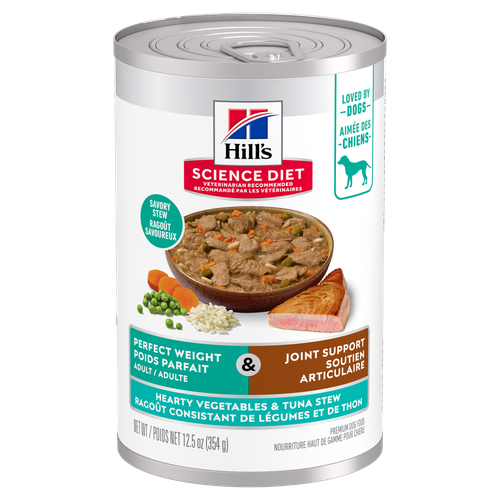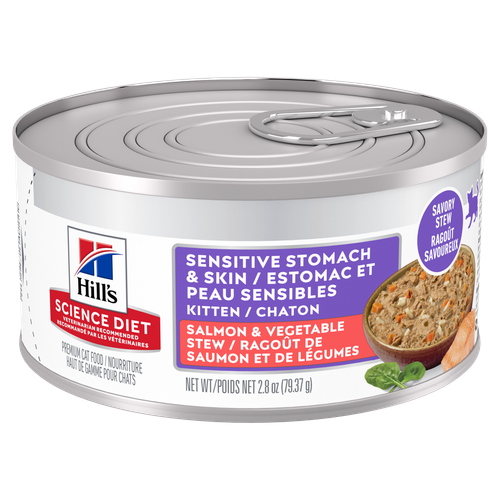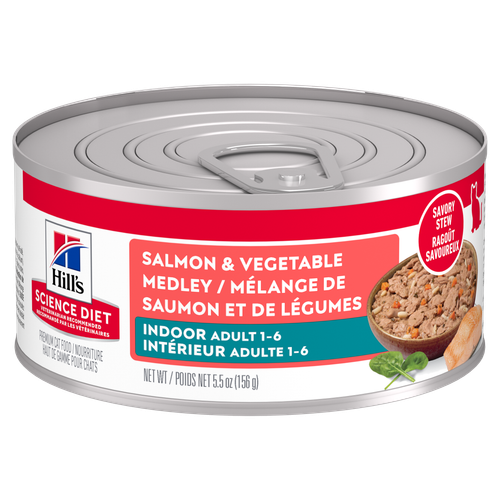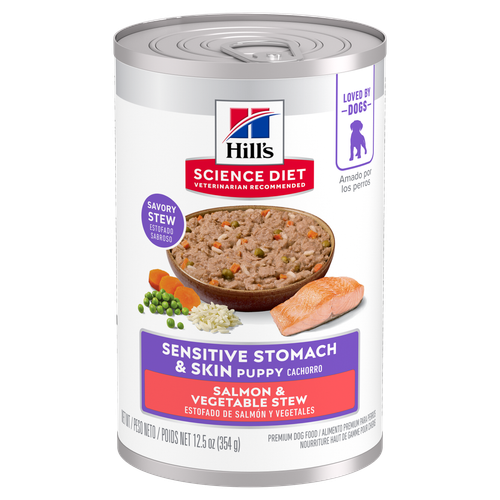
-
Find the right food for your petTake this quiz to see which food may be the best for your furry friend.Find the right food for your petTake this quiz to see which food may be the best for your furry friend.Featured products
 Healthy Cuisine, Adulte, assortiment de conserves
Healthy Cuisine, Adulte, assortiment de conservesHill's Science Diet Healthy Cuisine Variety Pack
Shop Now Sensitive Stomach & Skin, assortiment de conserves
Sensitive Stomach & Skin, assortiment de conservesHill's Science Diet Sensitive Stomach & Skin Variety Pack
Shop Now Adult Perfect Weight & Joint Support Hearty Vegetables and Tuna Stew Dog FoodShop NowFeatured products
Adult Perfect Weight & Joint Support Hearty Vegetables and Tuna Stew Dog FoodShop NowFeatured products Kitten Sensitive Stomach & Skin Salmon & Vegetable Stew
Kitten Sensitive Stomach & Skin Salmon & Vegetable StewSupports kitten growth, digestive health, nourishes skin and promotes a lustrous fur
Shop Now Adult Indoor Salmon & Vegetable Medley Cat Food
Adult Indoor Salmon & Vegetable Medley Cat FoodPrecisely balanced nutrition for indoor cats with the delicious taste of savory salmon and vegetables
Shop Now Adult Urinary Hairball Control Savory Chicken Entrée cat food
Adult Urinary Hairball Control Savory Chicken Entrée cat foodSupports the health of the whole urinary system with optimal levels of magnesium
Shop Now -
Dog
- Dog Tips & Articles
-
Health Category
- Weight
- Food & Environmental Sensitivities
- Urinary
- Digestive
- Joint
- Kidney
- Dental
- Cancer
-
Life Stage
- Puppy Nutrition
- Adult Nutrition
- Senior Nutrition
Cat- Cat Tips & Articles
-
Health Category
- Weight
- Skin & Food Sensitivities
- Urinary
- Digestive
- Kidney
- Dental
- Stress
- Cancer
-
Life Stage
- Kitten Nutrition
- Adult Nutrition
Featured articles Pet Food Storage Tips
Pet Food Storage TipsDiscover how and where to store your dry, as well as canned, dog and cat food. Learn how to find the "best before" dates on all Hill's pet food packaging.
Read More Compare Your Pet Food's Calories to Other Brands
Compare Your Pet Food's Calories to Other BrandsCompare Hill's Science Diet dog and cat food's calories against other pet food brands and AAFCO recommended maximum calorie count.
Read More The Incredible Science Behind Your Pet's Microbiome
The Incredible Science Behind Your Pet's MicrobiomeLearn what a pet's microbiome is, how it contributes to your pet's gut & overall health, and why nutrition is important in maintaining healthy microbiomes.
Read More -


Related Image Content
The kidneys, the frequently forgotten but life-sustaining organs, remove waste from the bloodstream and regulate fluids in the body. If the kidneys are not able to do their job, the result could be life threatening for your dog.
What is kidney disease?
Kidneys are very important because they remove waste substances from the blood, and maintain the normal balance of fluid and minerals within the body. Any condition which damages the kidneys is referred to as kidney or renal disease. In some cases, dogs may show early warning signs of kidney disease. However, signs of serious illness only appear after 75% of the kidneys’ function has already been lost. This is the reason why early detection is so important, especially for dogs age 7 or older. A simple blood test and urinalysis are all that is required to detect kidney disease.
What causes kidney disease in dogs?
The kidneys can be damaged by a wide range of conditions including injury, infection, toxins, and cancer. This damage is usually irreversible. Kidney disease is common in dogs, but with early diagnosis and treatment, progression can be limited and many dogs go on to live happily for years after diagnosis. Factors that can make dogs more prone to kidney disease include the following:
Age: The chance of developing kidney problems in dogs increases after the age of 7.
Food: Some dog foods high in phosphorus and dog foods with increased levels of protein can increase the progression of kidney disease.
Breed: Some dog breeds, including English Cocker spaniels, bull terriers and German shepherds, are more likely to develop particular types of kidney disease. Learn more about a very special German shepherd named Buddy that was diagnosed with kidney failure.
Environment: Some chemicals, including certain disinfectants, antifreeze, lead paint and some human medications can damage the kidneys.


Tasty Tips
Does my dog have kidney disease?
The signs of kidney disease can be difficult to recognize but if you notice any of the following, it could mean your dog has a kidney problem. Please check with your veterinarian if you are seeing any of these signs.
- Increased thirst and urine production
- Decreased appetite
- Weight loss
- Bad breath
- Vomiting and diarrhea
- Sore mouth
- Weakness
- Lack of energy and increased sleeping
- Poor coat appearance
- Depression

If your dog is diagnosed with kidney disease, your veterinarian may describe it as either acute or chronic.
Acute Kidney Disease: Acute, or sudden, kidney disorders can be caused by:
- Blood loss
- Shock
- Surgical stress
- Trauma
- Severe dehydration
- Poisons
- Drugs
- Obstructed urine flow
- Infection
Chronic Kidney Disease: Chronic, or long-term, kidney disease can result from the above factors, plus: Breed and hereditary tendencies, in coordination with nutritional factors and immune system defects. Chronic kidney disease is progressive and irreversible.
Unfortunately, the signs of kidney disease usually do not appear until 75% of kidney function has been lost. Once chronic kidney failure develops, it cannot be reversed.
IMPORTANT: Early stages of kidney disease will show no signs or symptoms. An increase in thirst may be the first sign of kidney failure — if you notice this, or any of the above signs, consult your veterinarian immediately.
Treatment: The importance of nutrition
The food your dog eats plays an important role in his overall health and well-being. If your dog is diagnosed with kidney or renal disease, modifying his food can help manage the disease by reducing the amounts of protein, phosphorus and salt in his food. Phosphorus restriction seems especially important in lessening the severity of the clinical signs and progression of kidney damage. Reducing protein levels may also help restore normal acid-base levels. Balanced nutrition is an essential part of an active, healthy lifestyle. If your dog has kidney problems, the right nutrition can positively impact your dog’s quality of life. For accurate diagnosis and treatment options, always consult your veterinarian and ask them to recommend the best food for your dog’s kidney health.
Ask Your Veterinarian About Kidney Disease:
- Are there any foods I should avoid giving my dog because of his condition?
- Ask how human food may affect your dog’s health.
- Would you recommend a Hill’s® Prescription Diet® dog food for my dog’s kidney health?
- Ask about special nutritional concerns for your dog
- How much / how often you should feed the recommended food to your dog
- Discuss which treats you can feed your dog with the recommended food
- How quickly should I expect to see signs of improvement in my dog’s condition?
- Can you provide me with written instructions or a booklet on kidney disease for my dog?
- What is the best way (email/phone) to reach you or your hospital if I have questions?
- Ask if you need a follow-up appointment.
- Ask if a reminder email or notice will be sent.


One of our staff authors prepared this article for you
Related products


Gentle on stomachs while nourishing skin & supporting development in growing puppies

Hill's Science Diet Healthy Cuisine Variety Pack

Hill's Science Diet Sensitive Stomach & Skin Variety Pack
Related articles

Proper nutrition for your pregnant or nursing dog is vital to her and her puppy's health. Learn what you should do provide her with the proper nutrients.

Discover fun and engaging games and other ways to help your dog exercise, keeping him happy and healthy.

Learn how to stop your dog from begging at the dinner table, and understand how it can help contribute to his health.

Gather the following puppy supplies to prepare your family for all the fun (and commitment) that comes with being a dog parent.

Put your dog on a diet without them knowing
Our low calorie formula helps you control your dog's weight. It's packed with high-quality protein for building lean muscles, and made with purposeful ingredients for a flavorful, nutritious meal. Clinically proven antioxidants, Vitamin C+E, help promote a healthy immune system.
Put your dog on a diet without them knowing
Our low calorie formula helps you control your dog's weight. It's packed with high-quality protein for building lean muscles, and made with purposeful ingredients for a flavorful, nutritious meal. Clinically proven antioxidants, Vitamin C+E, help promote a healthy immune system.

